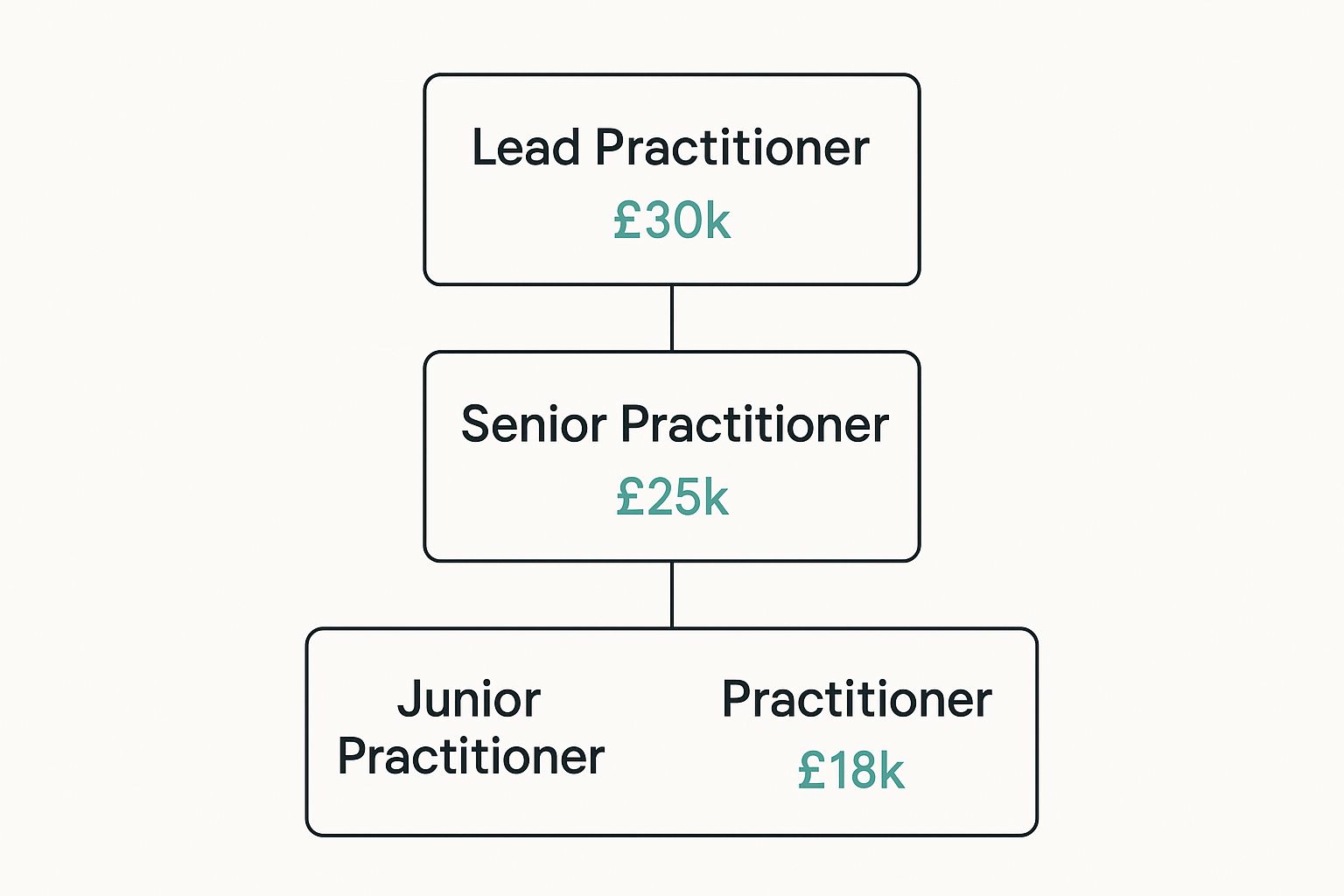
Thinking about a career with young children? One of your first questions is probably about the pay. Let's get right to it: the average early years practitioner salary in the UK is about £20,802 per year, which works out to roughly £10.28 per hour.
But that's just an average. Think of it as a starting point, because what you actually earn can change a lot depending on where you live, your qualifications, and your experience. This guide will walk you through what to expect and how you can boost your income.
A Snapshot of UK Early Years Salaries
Understanding the typical salary is the first step in planning your career path. While the national average gives you a good benchmark, it’s the regional differences and potential for growth that tell the whole story. For anyone passionate about shaping young minds, knowing your earning potential is key to building a career that's not only fulfilling but also financially sustainable.
Before we dive into the details, you might want a fuller picture of the role itself. You can find out more about what an early years practitioner does in our detailed guide.
Average Earnings Across the UK
Looking at recent data, most people starting out in the field can expect to earn somewhere between £19,000 and £22,000. It's a fairly tight range for entry-level roles, but where you live really matters.
For example, practitioners in England might see salaries closer to £27,000 a year on average. In Scotland, it’s around £26,000, while in Wales, the figure is nearer £20,000. These differences often come down to local demand and the cost of living in that area.
To help break it down, here’s a simple table with the key figures.
Average Early Years Practitioner Salary UK Snapshot
This table provides a quick overview of typical earnings for Early Years Practitioners across the United Kingdom.
|
Metric |
Average Figure |
|---|---|
|
Annual Salary |
£20,802 |
|
Monthly Salary |
£1,733 |
|
Hourly Wage |
£10.28 |
It's worth remembering that these numbers are just the beginning.
Your qualifications, the experience you build up over time, and the type of setting you choose to work in—be it a private nursery, a state-run school, or something else—will all play a huge part in what you actually take home. We’ll get into all of those factors as we go through this guide.
How Your Location Shapes Your Paycheck
While the national average salary for an early years practitioner gives you a useful benchmark, where you live in the UK can completely change your earning potential. Your postcode plays a surprisingly big part in what you take home, with some regions offering far more competitive pay than others.

Think of it like this: the cost of living in a major city like London is much higher than in a smaller town. To attract and keep talented practitioners, employers in these expensive areas have to offer higher wages to make the roles viable. This economic pressure creates salary hotspots all over the country.
Exploring the UK Salary Map
The difference in pay from one place to another is substantial. While the average UK salary sits around £27,000, some locations offer a good deal more. For instance, practitioners in Aberdeen can earn an average of £33,193 a year.
This regional variation is also clear in places like Kent, where salaries can reach as high as £49,400. Meanwhile, London suburbs such as Wembley and West London report averages between £30,000 and £35,750, showing a fragmented pay landscape where local demand really dictates your value. You can explore more about these regional salary differences and what they mean for your career.
This shows just how crucial it is to look beyond the national average when you’re sizing up your potential income.
Why Do These Pay Gaps Exist?
Several key factors are behind these regional differences in an early years practitioner salary. Getting to grips with them can help you make some smart career moves.
-
Cost of Living: As mentioned, areas with higher living costs—especially for housing and transport—generally have to offer higher salaries. Employers simply have to compensate for these expenses to attract staff.
-
Local Demand: Some regions have a bigger shortage of qualified practitioners than others. This high demand gives you more bargaining power and often leads to more competitive salary offers from employers who are keen to fill their vacancies.
-
Funding and Investment: The level of local authority and private investment in early years education can vary massively. Areas with better-funded nurseries and pre-schools are often in a stronger position to offer better pay and benefits.
By researching the early years sector in different cities and regions, you can identify areas where your skills are most valued. A willingness to relocate could result in a significant boost to your annual income.
Ultimately, being strategic about your location is one of the most powerful tools you have for maximising your earnings. Your qualifications and experience are vital, of course, but where you choose to apply them can make a huge difference to your pay packet.
Why Qualifications Directly Impact Your Salary
In the early years sector, your qualifications are much more than just certificates on the wall—they are your direct path to a higher salary. Every new level you achieve unlocks greater responsibilities and, in turn, a better early years practitioner salary. It’s the clearest way to boost your long-term earning potential.

Think of it this way: an entry-level practitioner with a Level 2 qualification is an essential part of the team, but they have to work under supervision. While this is a fantastic starting point, your salary will naturally reflect this supportive role. The real game-changer is achieving a Level 3 qualification.
This higher-level diploma proves you have the comprehensive skills and knowledge needed to work independently. It signals to employers that you can be trusted to lead activities, manage small groups, and take on a more authoritative role. This step-up in responsibility is directly rewarded with a better salary.
The Path From Assistant To Leader
Investing in your education creates a clear and achievable career path. It’s a direct investment in your financial future, with each step offering a tangible reward.
Here is what that progression typically looks like:
-
Level 2 Qualified Assistant: You'll support lead practitioners, help with daily routines, and engage with children under direct supervision. Your salary will be at the entry-level range for the sector.
-
Level 3 Qualified Practitioner: Once qualified, you can work unsupervised and may be responsible for a key group of children. This autonomy is exactly why a Level 3 qualification almost always comes with a significant pay rise.
-
Room Leader or Senior Practitioner: With experience and a solid Level 3 qualification, you can step into leadership roles, overseeing a specific room or age group. This position involves more planning and staff coordination, which is reflected in a higher salary.
Advancing your qualifications is the most reliable way to increase your value as an employee. An employer sees a Level 3 Diploma not just as a piece of paper, but as a commitment to the profession and a readiness to take on more complex duties.
Specialisms That Boost Your Paycheque
Beyond the core qualifications, specialised training can make you an indispensable asset to any early years setting. This extra expertise often translates into a higher salary because you bring unique and valuable skills to the team.
For instance, becoming a Special Educational Needs Coordinator (SENCO) requires additional training and equips you to support children with diverse needs. This specialism is highly sought after and can provide a significant boost to your income. Similarly, qualifications in areas like paediatric first aid or safeguarding leadership can open doors to new responsibilities and better pay.
Ready to take that crucial next step? The CACHE Level 3 Diploma in Early Years Education and Care from Stonebridge is the industry-standard qualification that allows you to become a confident, unsupervised practitioner and unlock your true earning potential.
Comparing Pay Across Different Childcare Settings
Where you decide to work will have a huge say on your early years practitioner salary and the benefits that come with it. The financial picture can look drastically different depending on whether you're in a private nursery, a state-maintained school, or another type of childcare environment. It's never just about the hourly rate; you've got to look at the whole package.

A state-run school, for example, will likely have a more predictable salary scale that lines up with local authority pay grades. These jobs often come with the added perks of better pension contributions and more generous holiday allowances, which adds serious value beyond your monthly pay packet.
On the other hand, private day nurseries can be a bit of a mixed bag. A high-end nursery in a city centre might offer a higher hourly wage to pull in the best talent, whereas smaller, independent settings might be working with tighter budgets.
A Closer Look at the Differences
The type of setting you're in really does impact your earnings. Getting to grips with the ins and outs of different childcare settings can help you pinpoint those higher-paying opportunities. It’s always worth weighing up the pros and cons of each environment to see what fits your financial and career ambitions.
Here’s a rough breakdown of what you might find:
-
Private Day Nurseries: This is where you'll find a huge number of early years jobs. Pay can vary massively depending on the nursery's size, its location, and its fees. While some are very competitive, others might hover closer to the National Minimum Wage.
-
State-Maintained Nursery Schools: Often connected to a primary school, these settings tend to offer pay and conditions that mirror other local government jobs. This can mean better job security, a healthier pension, and holidays that align with the school calendar.
-
Pre-Schools and Playgroups: These are often run by charities or community groups and can operate on smaller budgets. Salaries might be lower, but the roles can provide more flexible, term-time-only hours, which is a big draw for many.
-
Childminding: If you go the self-employed route as a childminder, your income depends entirely on the fees you set and how many children you look after. It offers fantastic independence but also means you’re in charge of your own taxes, pension, and sick pay.
Remember that the advertised salary is only part of the story. Always ask about pension schemes, paid sick leave, and opportunities for funded training, as these benefits can make a lower-paying role more valuable in the long run.
Even within the same organisation, pay can fluctuate. For instance, data from the London Early Years Foundation (LEYF) shows that practitioners aged 21 and over can earn anywhere between £9.65 and £17.07 per hour. That's a huge internal range and shows just how much roles can differ.
Practical Steps to Increase Your Income
Knowing the average figures for an early years practitioner salary is one thing, but taking active steps to boost your own pay is far more empowering. With the right strategy, you can push past that entry-level wage and build a career that’s rewarding both personally and financially. It all comes down to combining your experience with targeted professional development.
One of the most direct ways to increase your earnings is by climbing the career ladder. Progression in the early years sector is well-defined, and each new role brings more responsibility and a higher salary. This isn’t about waiting for a promotion to land in your lap; it’s about proactively getting the qualifications that make you the obvious choice for that next step up.
Charting Your Career Progression
It’s always easier to get where you’re going when you have a map. Understanding the path ahead helps you set clear, achievable goals. As you gain qualifications and experience, you can transition from a practitioner role into senior positions that command a much healthier income.
This image shows the typical salary jumps you can expect as you move up through the ranks in your early years career.

As you can see, making the move from a Junior to a Lead Practitioner can add a significant amount to your annual salary, which really drives home the financial benefits of career advancement.
The journey up the ladder often looks something like this, with pay increasing at each stage.
Career Progression and Salary Potential in Early Years
|
Role |
Typical Qualification Level |
Estimated Average Annual Salary (UK) |
|---|---|---|
|
Nursery Assistant/Apprentice |
Level 2 Certificate/Diploma |
£18,000 – £21,000 |
|
Early Years Practitioner |
Level 3 Diploma |
£22,000 – £26,000 |
|
Senior Practitioner/Room Leader |
Level 3 Diploma + Experience |
£26,000 – £30,000 |
|
Deputy Manager |
Level 3+ Diploma, Leadership Quals |
£28,000 – £35,000 |
|
Nursery Manager |
Level 5+ Diploma, EYTS/QTS |
£35,000 – £45,000+ |
This table clearly illustrates how investing in your qualifications and gaining experience directly translates into higher earning potential throughout your career.
Actionable Strategies for a Bigger Paycheque
Besides chasing promotions, there are plenty of practical things you can do right now to increase your value and put yourself in a stronger position to negotiate a better salary.
Here are a few proven methods:
-
Get More Qualified: As we’ve mentioned, making the leap from a Level 2 to a Level 3 qualification is the single most effective way to unlock a higher salary band. It’s essential for serious career progression.
-
Develop a Specialism: Become the go-to expert in an area like Special Educational Needs (SEN), safeguarding, or outdoor learning. Nurseries often pay a premium for staff with these in-demand skills.
-
Take on Extra Responsibilities: Volunteer to lead projects, mentor new starters, or take charge of an area like health and safety. Showing initiative and leadership potential is a brilliant argument for a pay rise.
-
Negotiate with Confidence: When starting a new job or in your annual review, be ready to discuss your salary. Research the average pay for your role and experience in your area, and confidently state your case based on the value you bring.
Investing in your skills is a direct investment in your future income. Every new qualification or area of expertise you add to your CV strengthens your position and opens up new doors for financial growth.
Keeping your skills fresh and relevant is essential for moving forward. For more ideas, read our guide on the benefits of upscaling and see how it can help you climb that career ladder faster.
Get Qualified Your Way with Stonebridge
Ready to advance your career and increase your early years practitioner salary? Investing in your education is one of the most reliable ways to get ahead, but traditional college timetables don't work for everyone. That’s where a more flexible approach to learning can make all the difference.
Stonebridge Associated Colleges offers 100% online, career-focused courses, giving you the complete freedom to study whenever and wherever suits you best. You can finally get that career-boosting diploma without having to sacrifice your current job or family time.
Flexible Learning That Puts You in Control
We've designed our learning model to remove the usual barriers to education. Forget rigid schedules or getting locked into long-term financial commitments that add unnecessary stress.
Our innovative subscription model is simple and puts you in charge:
-
Affordable Monthly Fee: Access our full range of courses with a simple monthly payment, avoiding large upfront costs or complex credit agreements.
-
Study at Your Own Pace: Work through the course materials as quickly as you like, or take your time if life gets busy.
-
Pause or Cancel Anytime: You are in complete control. If your circumstances change, you can simply pause your studies and pick them back up when you're ready, without penalty.
With Stonebridge, you get the career-focused education you need to boost your salary, all on your own terms. Our tutor-supported courses offer a direct path to a more successful and rewarding career in the early years sector.
This approach means you can invest in your professional development with total confidence. You'll gain accredited qualifications that employers value, all while managing your budget and time in a way that works for you. It’s the smart way to build the skills you need for a brighter financial future.
Your Questions Answered
Starting a new career path naturally brings up questions. To help you feel confident about your next steps, we’ve put together some quick, straightforward answers to the queries we hear most often about becoming an Early Years Practitioner.
What Qualifications Do I Need to Become an Early Years Practitioner?
To become a qualified Early Years Practitioner in the UK, you’ll generally need a recognised Level 2 or Level 3 childcare qualification. A Level 2 certificate is a great starting point, allowing you to work under supervision.
However, the Level 3 Diploma is the gold standard that most employers look for, as it qualifies you to work unsupervised with children. Alongside this, you’ll usually need GCSEs in English and Maths at grade C/4 or above and will need to pass an enhanced DBS check.
Is There High Demand for Early Years Practitioners in the UK?
Yes, absolutely. The demand for skilled practitioners is consistently strong across the country. As government-funded childcare places continue to grow, so does the need for qualified professionals in nurseries, pre-schools, and other settings.
This means greater job security and a wider choice of where you want to work. This high demand also gives you more leverage when it comes to negotiating your early years practitioner salary, particularly in certain regions.
How Can I Progress My Career Beyond a Practitioner Role?
One of the best things about the early years sector is the clear career ladder. After gaining experience as a practitioner, you can move up to roles like Senior Practitioner or Room Leader, where you’ll take on more planning and leadership responsibilities.
From there, the next steps are often Deputy Manager and then Nursery Manager. If you'd rather specialise, you could train to become a Special Educational Needs Coordinator (SENCO) or an Early Years Teacher (EYT). Each step up brings new challenges and, typically, a healthy pay rise to match.
Ready to gain the qualifications you need for a successful and fulfilling career? At Stonebridge Associated Colleges, our flexible online courses are designed to fit around your life, helping you achieve your goals on your own terms. Explore our range of career-focused programmes today.




